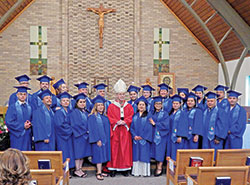IPI graduates encouraged to bear fruit in service to others
(En Espanol)

Graduates of the archdiocesan Intercultural Pastoral Institute are pictured with Archbishop Charles C. Thompson after a graduation ceremony in the chapel at Our Lady of Fatima Retreat House in Indianapolis on June 28. In all, 22 individuals received diplomas. (Photo by Mike Krokos)
By Mike Krokos
Oscar Salcedo almost didn’t graduate.
Personal problems caused him to step away from taking classes at the archdiocesan Intercultural Pastoral Institute (IPI) after his first year of studies, leading him to believe he wouldn’t complete the two-year leadership program.
But a phone call changed that.
“I received a call from Dr. Carmen Hernandez [the coordinator of IPI], urging me to return and finish the leadership program,” said Salcedo, a member of St. Bartholomew Parish in Columbus.
Although he initially told Hernandez “no, no, no … she kept insisting, until she convinced me to return to the institute. Thank you very much, doctor, for your insistence.
“I finally learned that my ‘no, no, no’ … was insignificant before the will of God,” Salcedo continued. “That is why I place myself before God’s disposal, that he use me as his instrument, and his will be done, not mine.”
Salcedo was chosen to give a speech on behalf of his classmates during IPI’s Pastoral Leadership certification program held on June 28 at Our Lady of Fatima
Retreat House in Indianapolis. Archbishop Charles
C. Thompson began the event by celebrating Mass, and the evening also included a graduation ceremony, the presentation of diplomas and dinner.
IPI forms pastoral and catechetical leaders within the various ethnic communities in the archdiocese and the Lafayette Diocese, and at the gathering, 22 graduates were recognized.
‘Let us go and make a difference’
In his homily, shared in Spanish, Archbishop Thompson congratulated the graduates on earning their certificates. Their work, he noted, included much time in “prayer, study and discernment for service in the Church.
“Those who have remained steadfast in faith, persevering in their efforts and ardent in missionary discipleship are to be recognized for the fruit of their labor,” he said. “Like trees that bear good fruit because their roots run deep in the Earth, so the roots of those being certified in spiritual direction and pastoral leadership must remain deeply connected to the person of Jesus Christ. Without a personal encounter and ongoing relationship with him, how does the fruit of one’s ministry remain good?”
The liturgy was celebrated on the feast of St. Irenaeus, the bishop of Lyons in what is now France for 25 years before being martyred around 202. He was known for his writing to dispute the heresies of his time and to explain principles of the Christian faith.
The archbishop told those in attendance the saint was “firmly rooted in Jesus Christ through a deep commitment to prayer, Scripture and the sacraments,” and that “his witness bore the good fruit of a life rooted in personal relationship with Jesus Christ.”
Like St. Irenaeus, Archbishop Thompson said, “we must allow ourselves to be instruments of his saving grace of healing, unity, mercy and reconciliation.”
Relying upon God’s divine grace available through word, sacrament and service, the archbishop encouraged the graduates to help carry out Jesus’ mission.
“Remaining forever deeply rooted in personal relationship with Jesus Christ, bearing the fruit of Good News of Salvation,” he continued, “let us go and make a difference in the lives of others. By your fruit of faith in action, may you be known.”
‘The teaching model of Jesus’
In her remarks to the 11th graduating class of the two-year formation program, Hernandez acknowledged the efforts, dedication, enthusiasm and commitment of the students.
“Starting today, you are going to give life to your lives. You are going to give life to your new paths as pastoral leaders,” she noted. “Always remember that the best model of Catholic leadership is that of the servant leader, the teaching model of Jesus that leads us to unite in prayer and help our brothers, particularly those most in need. St. John Paul II pointed it out well when he said, ‘Love is looking at the other, not to make use of him, but to serve him.’ ”
As they minister in the future, Hernandez continued, it will offer the graduates the chance to grow closer to Jesus, follow him, serve him and lead others to him.
“The God-love is the true strength of the soul, the powerful conviction that moves us to have confidence in him and to walk toward him, from love to the brother and in particular to the most in need, to the poor in a material and spiritual sense,” Hernandez said. “This is the direction that you, now pastoral leaders, must have as your north.”
Loving and serving God, Salcedo noted, will be at the heart of his mission.
“If we remain faithful to God, without a doubt, love will flourish in our being,” he said. “This is the love that comes from God who transforms us, makes us more serene, more optimistic, more compassionate, wiser. And it’s through love where you get the true way to serve and live in this world for others.”
(To learn more about the Intercultural Ministry Institute and its program, visit www.archindy.org/multicultural.) †
